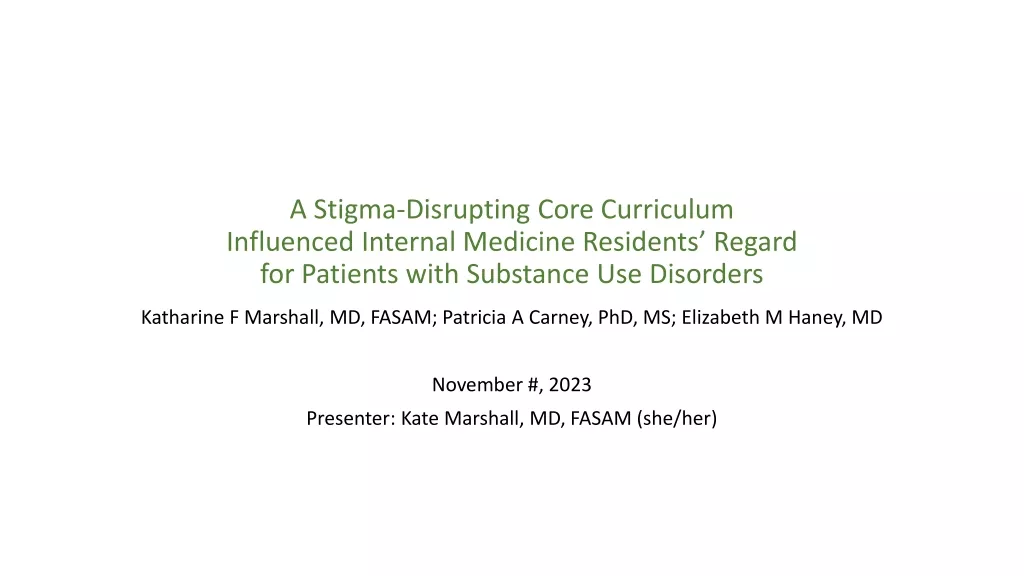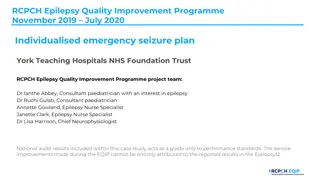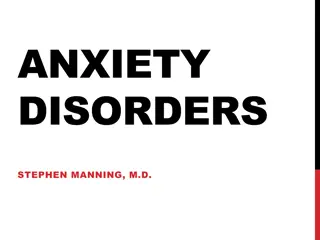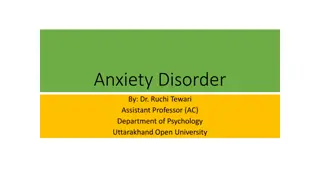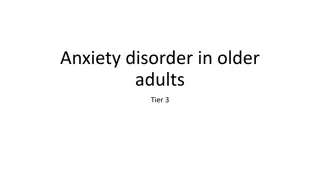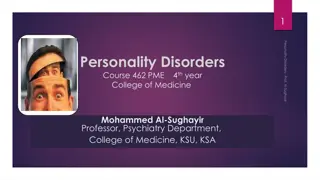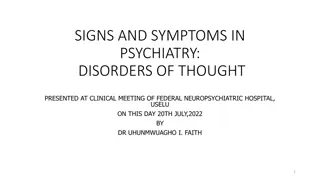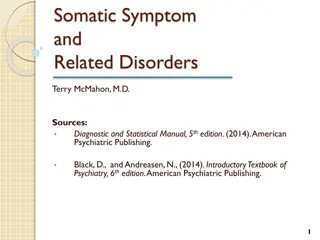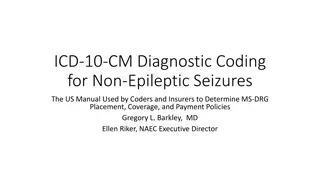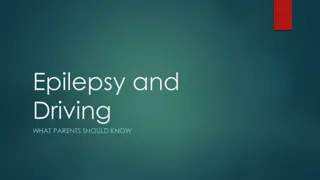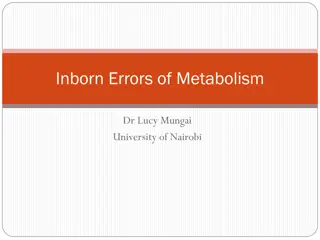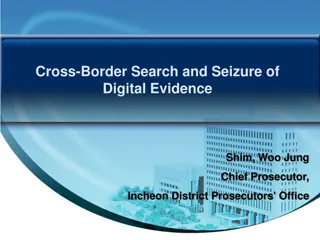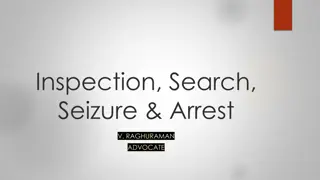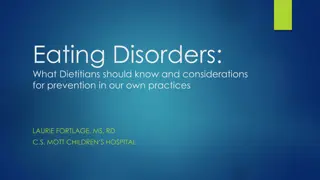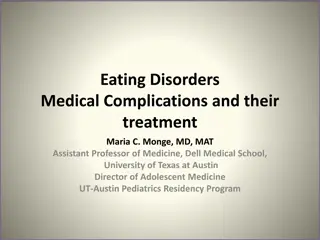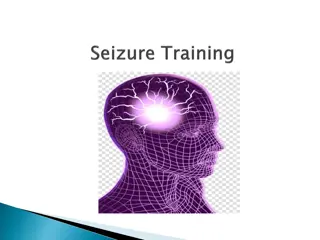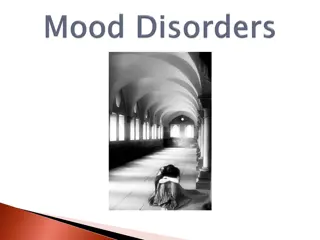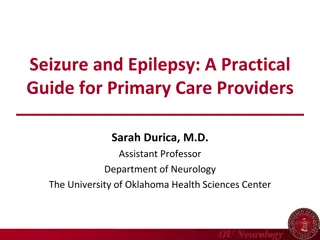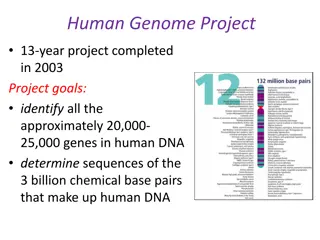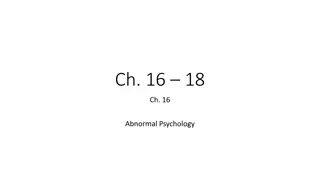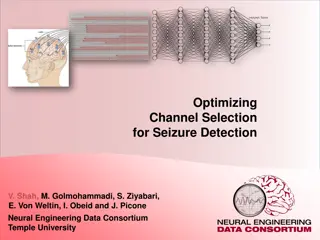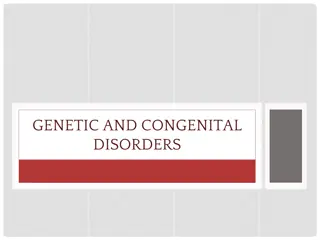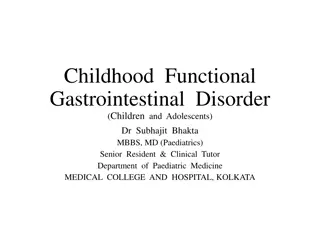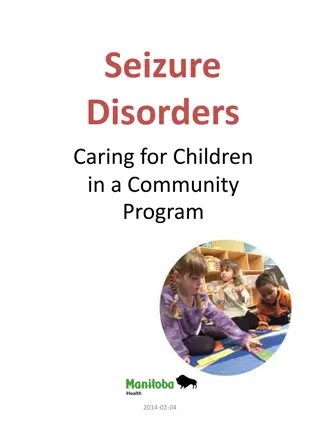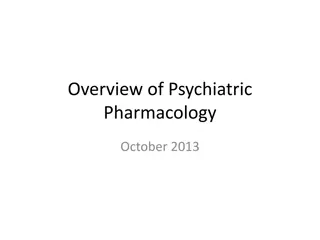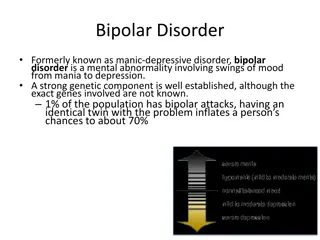Gynecological disorders
Common gynecological disorders including menstrual disorders and abnormal uterine bleeding. Find out about the nursing role in diagnosing and treating these disorders.
3 views • 22 slides
Enhancing Internal Medicine Residents' Approach to Patients with Substance Use Disorders
This study focuses on developing and implementing a stigma-disrupting curriculum to improve internal medicine residents' attitudes and knowledge regarding patients with substance use disorders. By addressing provider stigma and enhancing preparedness, the aim is to promote positive regard and increa
1 views • 27 slides
Exploring Mental Health Categories and Disorders
In today's categories, we delve into themes like stigma, recovery, myths, and facts surrounding mental health. We discuss various disorders including psychotic disorders and observable signs like hallucinations, delusions, and flat affect. Discover the signs and symptoms of mood disorders and high/l
1 views • 71 slides
Enhancing Care for Children with Epilepsy: A Quality Improvement Initiative at York Teaching Hospitals NHS Foundation Trust
Development of a digital epilepsy passport aiming to improve care and reduce risks for children with complex epilepsy at York Teaching Hospitals NHS Foundation Trust. The initiative addressed issues such as misplacement of paper emergency seizure plans, leading to delays in treatment. By incorporati
0 views • 16 slides
Overview of Human Genetic Disorders
Human genetic disorders encompass a range of conditions, from recessive disorders like cystic fibrosis to dominant disorders such as Huntington's disease. Examples include cystic fibrosis, Huntington's disease, and sickle-cell anemia. Understanding genetic disorders involves research and awareness o
0 views • 10 slides
Understanding Anxiety Disorders in DSM-5
Anxiety disorders encompass a range of conditions, from separation anxiety to social phobia and generalized anxiety disorder. The DSM-5 has re-conceptualized these disorders, grouping OCD in its own category and moving PTSD to trauma-related disorders. Recognizing symptoms and seeking appropriate tr
1 views • 96 slides
Understanding Anxiety Disorders and Related Conditions
Explore the distinguishing features of anxiety disorders such as generalized anxiety disorder, panic disorder, and phobias, along with insights into obsessive-compulsive disorder (OCD) and posttraumatic stress disorder (PTSD). Delve into the impact of conditioning, cognition, and biology on these co
2 views • 46 slides
Overview of Anxiety and Related Disorders
Anxiety disorders, such as PTSD, panic disorders, phobias, agoraphobia, and OCD, are characterized by varying degrees of fear and distress. Anxiety is a normal response to danger, but when it becomes chronic, it can lead to debilitating conditions. PTSD occurs post-trauma, panic disorders involve in
1 views • 42 slides
Understanding Anxiety Disorders: Causes, Symptoms, and Types
Anxiety disorders are a group of mental illnesses characterized by excessive and overwhelming anxiety and fear. This article explains the normal emotion of anxiety, symptoms of anxiety disorders, types of anxiety disorders, and common causes like genetics, brain chemistry, environmental stress, and
1 views • 8 slides
Understanding Anxiety Disorders in Older Adults
Anxiety disorders in older adults are prevalent but often unrecognized. These disorders can manifest alongside depression, impacting daily life. Risk factors include gender, education, health status, traumatic events, and more. Types of anxiety disorders include generalized anxiety, phobias, panic d
0 views • 17 slides
Understanding Personality Disorders: A Comprehensive Overview and Classification
Dive into the world of personality disorders with this informative presentation by Professor Al-Sughayir. Explore the definition of personality, various types of disorders, traits, terminologies, and etiology. Gain insights into normal versus abnormal traits, functional impairments, and the role of
1 views • 25 slides
Understanding Somatic Symptom Disorders, Conversion Disorders, and Dissociative Disorders
Somatic symptom disorders manifest as physical symptoms without apparent cause, while conversion disorders involve specific physical symptoms incompatible with medical conditions. Illness anxiety disorder involves interpreting normal sensations as disease symptoms. Dissociative disorders lead to a s
1 views • 41 slides
Understanding Thought Disorders in Psychiatry: Insights from Clinical Meeting Presentation
Explore the definitions and divisions of thought disturbances in psychiatry, including disorders of thought stream, form, content, and possession. Delve into thought stream disorders like tempo and continuity disruptions, as well as form of thinking disorders seen in conditions like schizophrenia. G
1 views • 32 slides
Understanding Somatic Symptom and Related Disorders
Exploring the key features, diagnostic criteria, contributing factors, and management principles of Somatic Symptom and Related Disorders. This comprehensive guide covers the clinical manifestations, co-morbidities, and treatment approaches associated with these disorders, shedding light on somatic
2 views • 38 slides
Understanding ICD-10-CM Coding for Seizure Disorders: A Comprehensive Guide
ICD-10-CM codes play a crucial role in diagnosing and managing seizure disorders, including epilepsy and non-epileptic seizures. This detailed guide covers the coding guidelines for various types of seizures, such as intractable epilepsy and conversion disorder with seizures. It also explains how th
0 views • 6 slides
Understanding Epilepsy and Driving: What Parents Need to Know
People living with epilepsy face challenges regarding driving, as seizures can pose a serious risk. Laws and regulations vary by state, requiring individuals to be seizure-free for a specific period. Teenagers with epilepsy may desire independence through driving, prompting discussions on seizure ma
1 views • 20 slides
Understanding Inborn Errors of Metabolism and Metabolic Disorders
Inborn Errors of Metabolism (IEM) are genetic disorders that disrupt metabolic pathways, leading to substrate accumulation or product deficiency. These disorders can be classified based on toxic accumulation, protein metabolism, carbohydrate intolerance, lysosomal storage issues, energy production d
0 views • 29 slides
Understanding Co-occurring Mental and Physical Health Conditions
Co-occurring mental and physical health disorders are prevalent and require an integrative multidisciplinary approach for effective assessment and treatment. This holistic approach helps address the complexity of managing multiple disorders in an integrated healthcare setting. Through a multi-direct
1 views • 37 slides
Understanding Functional GI Disorders: A Comprehensive Overview
Functional GI disorders encompass a range of conditions affecting the gastrointestinal system, such as irritable bowel syndrome and disorders of the gut-brain interaction. These disorders are characterized by no structural abnormalities but are influenced by factors like motility disturbance, viscer
0 views • 42 slides
Cross-Border Search and Seizure of Digital Evidence in Global Criminal Investigations
The globalization of criminal information has brought challenges to the search and seizure of digital evidence across borders. Issues like remote data storage, mutual legal assistance procedures, and technical difficulties in prosecution systems require a new approach. Initiatives such as the CLOUD
0 views • 13 slides
Understanding Genetic Disorders and Their Impact on Health
Genetic disorders are caused by abnormalities in genes or chromosomes, leading to various health conditions. Inherited disorders can be passed down from parents to children, affecting physical makeup and processes in the body. In India, there is a high prevalence of genetic disorders, particularly i
1 views • 12 slides
Understanding Inspection, Search, Seizure & Arrest in Taxation Laws
Detailed exploration of the provisions related to inspection, search, seizure, and arrest under tax laws, including who may conduct inspections, the reasons for conducting them, the meaning of "reason to believe," and the role of the proper officer. Learn about the powers, procedures, and significan
2 views • 49 slides
Understanding Eating Disorders: Types, Signs, Effects, and Recovery
Eating disorders are mental disorders characterized by unhealthy eating habits and can have severe physical and psychological consequences. This article explores the definition of eating disorders, signs to look out for, different types such as Anorexia Nervosa, Bulimia Nervosa, Pica, and Purging Di
0 views • 10 slides
Understanding Eating Disorders: Insights for Dietitians
Eating disorders are complex neurobiological conditions that are not merely about control or weight management. These disorders can affect individuals of all genders, body sizes, and socioeconomic backgrounds. Dietitians play a crucial role in identifying, assessing, and treating eating disorders, a
0 views • 41 slides
Understanding Eating Disorders: Medical Complications and Treatment
This presentation by Dr. Maria C. Monge covers the common eating disorders in teenage patients, potential medical complications, and the role of the medical team in treatment. It includes definitions of disorders like Anorexia Nervosa, Bulimia Nervosa, and Binge Eating Disorder according to DSM-5 cr
0 views • 60 slides
Understanding the Fourth Amendment: Search and Seizure Laws in the United States
The Fourth Amendment of the United States Constitution protects individuals from unreasonable searches and seizures by the government. It outlines the requirements for obtaining a search warrant, defines a reasonable expectation of privacy, and details the types of searches allowed without a warrant
0 views • 18 slides
Understanding Seizure Disorders and First Aid
Seizure disorders can have varying symptoms and may occur at any time in life. Immediate medical treatment is crucial for the first seizure. Factors like stress, illness, temperature changes, and photosensitivity can impact seizure thresholds. Different types of seizures, including focal aware tonic
0 views • 17 slides
Understanding Neurodevelopmental Disorders in Childhood and Adolescence
Neurodevelopmental disorders in childhood and adolescence encompass a range of conditions including intellectual disabilities, communication disorders, autism spectrum disorder, and attention deficit/hyperactivity disorder. These disorders impact cognitive development, adaptive functioning, and comm
0 views • 30 slides
Understanding Sleep Disorders: Classification and Diagnosis
Sleep disorders encompass various conditions affecting sleep patterns and quality. They are classified into categories such as insomnia, sleep-related breathing disorders, central disorders of hypersomnolence, circadian rhythm sleep-wake disorders, parasomnias, and sleep-related movement disorders.
0 views • 32 slides
Understanding Grief and Depressive Disorders: A Comparative Analysis
Grief and depressive disorders share similarities but also have distinct differences. Grief is a universal emotional state following loss, while depressive disorders involve prolonged mood disturbances. The stages of grief include denial, anger, bargaining, depression, and acceptance, with intervent
0 views • 79 slides
Understanding Seizures and Epilepsy: A Practical Guide for Primary Care Providers
This practical guide provides valuable insights into seizures and epilepsy for primary care providers, covering topics such as different seizure types, epilepsy definition and treatment initiation, antiseizure medications, and status epilepticus management. Terminology and a clinical scenario are di
0 views • 53 slides
Understanding Genetic Disorders and the Human Genome Project
The Human Genome Project, completed in 2003, aimed to identify all human genes and DNA sequences. Genetic disorders, like autosomal disorders and Huntington's disease, can result from mutations at different levels, affecting single genes, chromosomes, or multiple genes. Albinism and cystic fibrosis
0 views • 37 slides
Understanding Abnormal Psychology: Disorders, Symptoms, and Treatments
Explore the world of abnormal psychology through the lens of different disorders like depression, anxiety, and phobias. Learn about the definitions of abnormal behavior, DSM-V classifications, and various types of psychological disorders. Delve into the complexities of mental health conditions such
0 views • 39 slides
Optimizing Channel Selection for Seizure Detection with Deep Learning Algorithm
Investigating the impact of different channel configurations in detecting artifacts in scalp EEG records for seizure detection. A deep learning algorithm, CNN/LSTM, was employed on various channel setups to minimize loss of spatial information. Results show sensitivities between 33%-37% with false a
0 views • 12 slides
Overview of Classification of Psychiatric Disorders
Psychiatric disorders are illnesses with various manifestations that impact functioning due to disturbances in biological, social, genetic, and other factors. Two key classification systems, ICD-10 and DSM-5, categorize over 200 types of psychiatric illnesses. The ICD-10 includes categories like org
0 views • 18 slides
Overview of Genetic and Congenital Disorders and Their Causes
Explore the terminology, causes, characteristics, and results of genetic and congenital disorders, as well as the disorders of single-gene inheritance. Learn about autosomal dominant disorders like Marfan Syndrome and Neurofibromatosis. Discover how single-gene disorders are inherited and their impa
0 views • 24 slides
Understanding Childhood Functional Gastrointestinal Disorders
Functional Gastrointestinal Disorders (FGIDs) in children and adolescents are characterized by chronic or recurring symptoms that cannot be fully explained by current structural or biochemical tests. These disorders emphasize the role of normal development in symptom presentation and the lack of evi
0 views • 46 slides
Understanding Seizure Disorders in Children: Causes, Types, and Response
Seizure disorders in children can be caused by various factors such as brain development issues, brain injuries, infections, and more. Triggers like stress, lack of sleep, and certain lifestyle habits can lead to seizures. There are different types of seizures, including tonic-clonic, absence, myocl
0 views • 20 slides
Overview of Psychiatric Pharmacology: A Comprehensive Guide from 2013
This presentation delves into the nuances of psychiatric pharmacology, exploring common psychiatric conditions, historical perspectives on medical treatments, categories of psychiatric medications, and principles of treatment. It also touches on mental illness definitions from DSM-IV-TR and DSM-V, a
0 views • 27 slides
Understanding Mental Health Disorders: Bipolar Disorder, Anxiety Disorders, & More
Exploring various mental health disorders such as Bipolar Disorder, Anxiety Disorders, Generalized Anxiety Disorder, Panic Disorder, and Phobic Disorders. Learn about their symptoms, prevalence, and impacts on individuals' lives.
0 views • 41 slides

